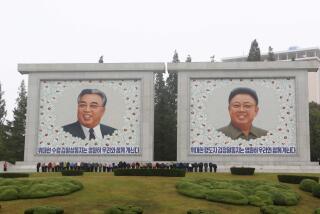Baker Seeks Wider Ties With Soviets : Diplomacy: Secretary tells Congress Kremlin’s aid to Cuba and Central America is preventing better relations.
- Share via
WASHINGTON — Secretary of State James A. Baker III said today that the United States is seeking a new strategic relationship with the Soviet Union but that Moscow’s policy toward Cuba and Central America is the biggest obstacle to wide improvement in U.S.-Soviet ties.
Baker told the Senate Foreign Relations Committee the Soviet Union bears a special responsibility to contribute to peace in Central America because its aid to Cuba and Nicaragua have supported destruction and war, especially in El Salvador.
“Soviet behavior toward Cuba and Central America still remains the biggest obstacle to a full, across-the-board improvement in relations with the United States,” he said.
Baker’s remarks came during a wide-ranging global review that included the Administration’s views on the political upheaval taking place in Eastern Europe and the Soviet Union.
He said the United States wants Soviet leader Mikhail S. Gorbachev’s perestroika policies to succeed.
“But we see perestroika as a means, not an end,” he said. “Our goals are to institutionalize a new strategic relationship with the Soviet Union through verifiable arms control treaties and confidence-building measures,” Baker said.
He said the United States seeks to forge a new global relationship with Moscow by pressing it to help end regional disputes peacefully.
Washington is also expanding its human rights agenda with the Soviet Union to include “cooperative efforts on the rule of law” and will offer technical cooperation as the Soviet Union moves away from “command economic models,” he said.
Baker stressed the importance of U.S. ties with the European Community and for an open door in Europe to U.S. economic ties.
“Indeed, the U.S.-EC relationship is so significant that stronger cooperative mechanisms and a strengthened set of institutional and consultative links should be developed,” he said.
He said Washington looks forward to continued work with the EC to help Eastern Europe, including possible participation in a new development bank to support political and economic reform there.
He said the Administration will shortly introduce legislation extending aid to Eastern European countries, building upon aid voted last year for Poland and Hungary.
The Administration is seeking $300 million in new aid for Eastern Europe, but Democrats in the Senate have already proposed increasing this to $511 million.
Baker told the committee the Administration is asking Congress for $15 billion in foreign aid for the 1991 fiscal year and urged reversal of the trend in Congress to fix aid levels for particular countries, inhibiting Administration flexibility.
More to Read
Sign up for Essential California
The most important California stories and recommendations in your inbox every morning.
You may occasionally receive promotional content from the Los Angeles Times.













